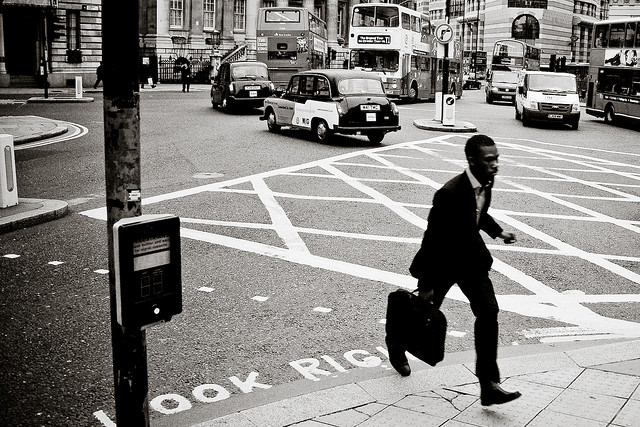It’s one thing to talk about awareness and enlightenment; it’s another to demonstrate it.
I cannot prove this, but I’m sure it’s accurate: all great sages throughout history gave their greatest teachings to their students at the point of action; they gave their most inspiring and truthful sermons about the field of action.
That’s where the true wake-up occurs.
It never occurs in words and ideas; that’s just more delusion, or spiritual ego—another fixed point of view without any bite or bark. That’s why people who sit in big halls and listen to teachers prattle on never grow, never learn anything and remain lost, confused and frightened, clinging desperately to the words they just heard, but then turning unchanged to face the waiting world without any new strength.
If you don’t believe me, then listen to what don Juan, Carlos Castaneda’s famed shamanic mentor said:
“The flaw with words is that they always make us feel enlightened, but when we turn around to face the world they always fail us and we end up facing the world as we always have, without enlightenment. For this reason, a warrior seeks to act rather than to talk, and to this effect he gets a new description of the world—a new description where talking is not that important, and where new acts have new reflections, and a new world is born.”
I am not interested in peoples’ various explanations of what is inexplicable. I am not interested in peoples’ opinions masquerading as Ultimate Truth. I am not interested in verbal gymnastics as proof of enlightenment. I am not interested in what people say, but in what they do and how they do it.
I am interested in how we act, in how we demonstrate whatever enlightenment we may have.
I confess that I have a fondness for themes such as personal responsibility, integrity and impeccability. In terms of spiritual development, we ought to put our attention on our actions, on how we meet the world at the point of contact, on how capable we are in the doing. We would learn much. We would come into an enlightenment of doing.
It’s one thing to talk about awareness and enlightenment; it’s another to demonstrate it.
I study the ways in which awareness is, or is not, manifest in our lives. Naturally, since our lives are full of time-bound commitments and promises, I’ve become acutely aware of whether people are on time, whether their agreements, commitments and promises are reliable ropes to go climbing with, or whether they are shoddy and worn and likely to fail on the rock of daily living, exposing a climber to injury or death.
During my years as a leadership and executive team consultant, I had ample opportunity to see the ways in which time management, including being on time, wrecked all kinds of things, including a few careers.
This, in spite of the most elaborate and well-defended reasons why they were late. This also held true for deliverables of all kinds. To believe the excuses would be to believe that alien pod-people were somehow manipulating the space-time continuum in a way that was cosmically similar to “the dog ate my homework.”
For me, it was never really an issue of time or time management or being late. It was, and is, always a matter of awareness-in-action.
Here is the transcript of one of my “sermons” about the field of action with an audience member in one of my public events. He started by confessing that he was always late. Late. Always late. Sound familiar?
Workshop Participant: I ‘m always late, and I can’t figure out why that is. No matter what I do, I’m always late. My wife will testify to this!
Robert Rabbin: You must be a good planner.
WP: No, I’m not, that’s why I’m always late.
RR: Yes, you are, that’s why you’re always late.
WP: What do you mean?
RR: You aren’t late by accident. To be late all the time is a form of impeccability; it takes intention, planning and management. You are a master of being late. I am equally impeccable, except that I am never late. I am a master of being on time.
WP: How do you manage that?
RR: In the same way that you manage to always be late.
WP: Are you saying I want to be late?
RR: Yes.
WP: Well, I’m not sure I agree with you. I am very busy with work and there are always valid reasons why I tend to be late.
RR: It doesn’t matter if you agree with me or not; you can’t argue with gravity. Look deeper and be honest; you’ll find some way in which you get gratification from being late, which is why you are always late. You get off on it. That’s the only valid reason you’re late: you want to be and you love it.
WP: Well, that’s just not true. I always feel bad when I’m late, and I certainly don’t like to make other people wait for me.
RR: You love feeling bad, and you love making people wait for you. That’s why you do it.
WP: No, I feel bad when I’m late.
RR: Feeling bad has become a kind of gratification for you. It’s become part of your self image.
WP: Okay, look; let’s assume I really want to change, let’s assume I’m ready to start being on time: what do I do?
RR: Let’s assume that. I can suggest several things. At one level, you have become habituated to lateness. It’s just a habit, which you have the power to change. In spite of the valid reasons you say are to blame for you lateness, you have programmed your internal guidance system to be late, and so you are late—all the time. Understand that you are not a victim of some tendency beyond your ability to control or change. It’s just a habit. External circumstances rarely are the cause.
Whenever we want to change something we are used to doing, we have to make the new behavior more important than the old behavior.
We have to decide what is at stake—what do we stand to gain if we make the change; what do we stand to lose if we don’t? So, figure this out for yourself, and be honest.
How important is it for you to be on time, to show people the respect and courtesy of meeting them when you say you will? How important is it for you to change your self-image from someone who is victimized by busyness to someone who is bigger and stronger than circumstances? You’ll have to find gratification from being on time.
At a slightly different level, I suggest you begin to be more mindful, moment to moment. Chronic lateness is partly due to the simple fact that you are unaware, you are not alert to time and place. You are lost in thought, or you have too narrow a focus.
Years ago, I studied Aikido. I remember one of my teachers telling me to keep one degree of focus while maintaining 360 degrees of awareness. This was really good advice.
It means that we pay total attention to what is right in front of us, without losing awareness of all that is around us.
Practice that, and I’m sure you’ll see that you will have more clarity in the moment, and you’ll notice more easily when it is time to stop one thing and move on to the next. You won’t get lost in your thoughtstream and lose track of time and space. We can learn to be maniacally focused on the one degree while remaining acutely aware of the 360 degrees. That is applied awareness. But you can’t apply awareness if you live in the thoughtstream.
You might also look more carefully at the place within you from where you make commitments. I make commitments carefully, which is to say I allow the commitment to come from silence, not from my mind.
Just because someone invites me to go somewhere is not enough for me to make a commitment; nor is it enough just because my own mind wants to go somewhere or meet someone. I am mindful of the promises I make, the deliverables I commit to. Not cautious; mindful, aware, careful. Full of care.
I have to feel the commitment come from silence. When it does, I can count on a kind of magic, which I call “inevitability,” to be sure I am never late. In other words, making commitments from silence is aligning with a flow of events that is not determined by the calculating mind. Events will tend to favor you in this way.
Let me give you an example:
I was scheduled to fly from the Oakland Airport to do a program. I don’t remember in this moment where I was going. Usually, I would allow an hour to get from my home in San Anselmo to the airport. This particular trip was on a Saturday morning, so traffic would have been light, and an hour would have been more than enough time. As I was having my breakfast, I suddenly got the urge to leave immediately, which made no sense because it was about three hours before I needed to get to the airport. By urge I mean an impulse from what I call silence. This feeling of urgency persisted. I finally relented. I left, shaking my head.
As I approached the onramp to the freeway, I found detour signs all over the place. I think a truck had turned over on the freeway and they closed the onramp and a part of the freeway. I had to go all over hell to get to the airport. It took me over two hours! If I had left when I planned to, I would have missed my plane.
I suppose you could call this feeling to leave my house intuition, or higher knowing, or a message from a guide or angel. I call it silence, which has a different operating system than the mind. My mind could not have anticipated those events.
When we talk about silence and the consciousness it represents, we should remember that it is truly unlimited. It knows things beyond the scope of our mind. It is the same consciousness, the same force, that has created this incredibly intricate, mind-boggling universe. It seems to me that that consciousness is certainly capable of being on time, if it wants to be.
It’s not natural to be inept and inefficient. It’s not natural to do things poorly.
We have to have a lot of ideas in our mind to thwart consciousness, which is impeccable. This is why I say that if we live from our mind, we will be subject to all of the ideas and beliefs we have about ourselves and the world. Why do we need all of that clutter? If we live from silence, we will be effective in what we do, naturally, because we will be acting in alignment with the creative power of the universe.
WP: You’re never late?
RR: Never. Well…almost never!
Love elephant and want to go steady?
Sign up for our (curated) daily and weekly newsletters!
Editor: Catherine Monkman
Photos: Photking/Flickr, Mark Ramsay/Flickr




Read 1 comment and reply